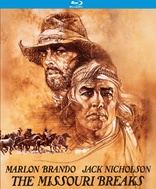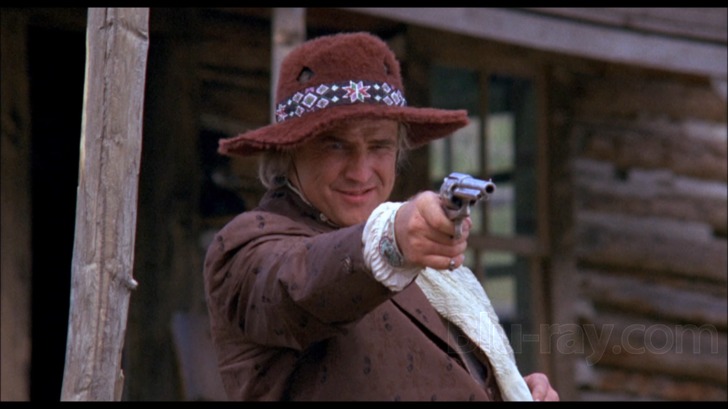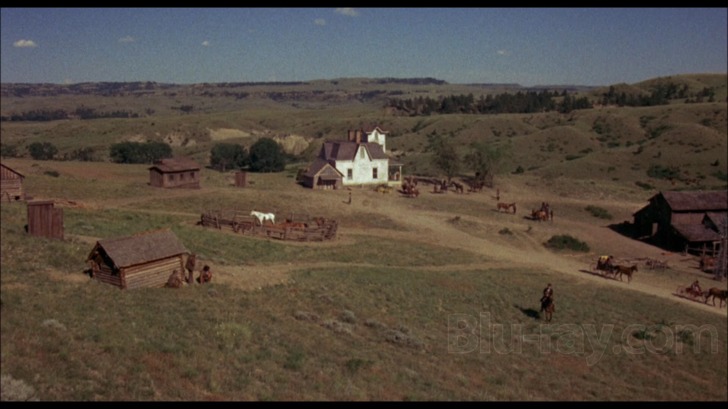The Missouri Breaks Blu-ray Movie
HomeThe Missouri Breaks Blu-ray Movie 
Kino Lorber | 1976 | 126 min | Rated PG | Dec 09, 2014
Movie rating
6.8 | / 10 |
Blu-ray rating
| Users | 0.0 | |
| Reviewer | 3.0 | |
| Overall | 3.0 |
Overview
The Missouri Breaks (1976)
An outlaw's attempts to go straight fall short when a rival rancher hires a psychotic gunman.
Starring: Marlon Brando, Jack Nicholson, Randy Quaid, Kathleen Lloyd, Frederic ForrestDirector: Arthur Penn
| Western | 100% |
| Drama | Insignificant |
Specifications
Video
Video codec: MPEG-4 AVC
Video resolution: 1080p
Aspect ratio: 1.84:1
Original aspect ratio: 1.85:1
Audio
English: DTS-HD Master Audio 2.0
Subtitles
English
Discs
25GB Blu-ray Disc
Single disc (1 BD)
Playback
Region A (B, C untested)
Review
Rating summary
| Movie | 4.0 | |
| Video | 3.0 | |
| Audio | 4.0 | |
| Extras | 1.0 | |
| Overall | 3.0 |
The Missouri Breaks Blu-ray Movie Review
Reviewed by Brian Orndorf January 24, 2015A film of unfortunate timing, 1976’s “The Missouri Breaks” arrived in theaters boasting the participation of stars Marlon Brando and Jack Nicholson. It was a heavyweight battle of thespians brought on by prior triumphs such as “One Flew Over the Cuckoo’s Nest” and “The Godfather,” solidifying the leads as legends in their field. Arriving in the shadow of future classics is a cruel fate for any feature, but Arthur Penn’s “The Missouri Breaks” was hit particularly hard by its production position, delivering an askew, permissive western with no real shape to an audience expecting a clash of the titans. Time has been kind to the endeavor, allowing modern viewers a chance to embrace the picture’s compelling eccentricities without the burden of outrageous expectations, at least those beyond the basic thrill of watching two of the finest actors in movie history slap on gun belts and chase each other around the old west.

In the wilds of Montana, land baron Braxton (John McLiam) is having trouble with rustlers stealing his horses for profit. Electing to hang one particular offender to set an example for the community, Braxton ends up raising the ire of Logan (Jack Nicholson), who was a close friend of the recently deceased. Returning to exact revenge on Braxton one way or another, Logan rounds up his gang, including Calvin (Harry Dean Stanton), Si (John P. Ryan), and Little Tod (Randy Quaid), to pull off a train robbery, thus funding a scheme to purchase land next to Braxton and begin a new round of rustling. The ease of execution is thwarted by the arrival of Clayton (Marlon Brando), a regulator with a few screws missing, but deadly when it counts. Setting out to track and kill Logan’s men for Braxton, the hired gun enjoys the view instead, studying Logan as he builds a secretive relationship with Braxton’s daughter, Jane (Kathleen Lloyd), who falls deep for the outlaw, and watching Calvin and Little Tod struggle with new rustling schemes that take them into Canada.
The director of “Bonnie and Clyde” and “Little Big Man,” Penn is secure in his insistence that “The Missouri Breaks” remain an offbeat picture that flirts with comedy as it explores the primal violence of the old west. It’s a cowboy movie in a vague sense, with the screenplay by Thomas McGuane using the mechanics of revenge and grizzled one-upmanship to secure a character study of two men gradually beginning to understand the severity of the situation, with death a reality that’s not initially considered by Logan, who’s driven by his need to make Braxton pay for his crime. He never quite understands the larger scheme of Clayon’s hunt, preferring to keep distracted with the rehabilitation of his newly acquired ranch and interest from Jane, who supplies an opportunity to destroy Baxter, only to find himself falling in love after years alone on the prairie.
“The Missouri Breaks” suggests aggression, but it takes nearly the entire film for anything angry to arrive. Instead of allowing dreams of vengeance to snowball, Penn pays attention to the details of the plan, studying the gang’s botched attempts to steal horses, pitting them against the unstoppable flow of river water, and Logan’s quest to turn his square of dead land into an empire of fertility, putting herculean effort into the building of a garden and irrigation system, gradually losing interest in thievery as Jane and hard work cools his mind. On the other end of the spectrum is Clayton, a lunatic with little decorum who plays an unusual game of research before he goes in for the kill, going undercover as a birder and even a frontier woman to acquire ideal position, with his accent wavering as unsteady as his horse riding skills. Of course, so much of Clayton is Brando screwing around, seeing what he can get away with before Penn tosses a film can at his head, and the absurdity works to a certain degree, keeping the hired gun a question mark for most of the picture, with the viewer never quite sure what this unkempt, flatulent man is capable of. The insistent mischief adds necessary tension to “The Missouri Breaks,” even when Brando goes overboard, bewildering his co-stars with his peculiarities.
Boosting the picture’s energy is a lively musical score from John Williams, who merges a western mood of folksy music with a mid-70s thump, adding an atmospheric bass strum to set up impending danger. Penn also masters the period feel, with generous use of wide shots to help set the scene, grasping the expanse of the virgin land while permitting viewers to get lost in the fantasy of the old west. “The Missouri Breaks” has a very naturalistic feel and a terrific handle on details of the day, without overdosing on galloping horses and leathery men. Penn keeps it all encouragingly cinematic, even while muting the traditional white hat/black hat routine.
The Missouri Breaks Blu-ray Movie, Video Quality 

Showing its age, the AVC encoded image (1.84:1 aspect ratio) presentation reveals a slight dullness. While nothing threatens the integrity of the naturalistic colors on display, hues are slightly washed out, though bolder images that favor daylight tend to bring out the range of the old west. Some mild filtering remains, holding back truly filmic qualities, with grain looking more noisy than textured at times. Detail isn't a priority with the softly-shot feature, but clarity is satisfactory, permitting viewers a chance to study the colorful cast and their constipated ways with the script, while distances hold steady, allowing for some sense of dimension. Contrast is challenged during interior interactions, leaving delineation troubling at times. Print is largely intact, with some speckling present and more severe scratches appearing during the end credits.
The Missouri Breaks Blu-ray Movie, Audio Quality 

The 2.0 DTS-HD MA sound mix leads with a study of John Williams's score, which retains decent instrumentation and command, delivering deep bass stings and emotional presence when the moment requires. Dialogue exchanges take the lead during the listening experience, with a crisp read of cowboy muttering and Brando's wild range of accents, keeping the performances intelligible. A few moments of crispiness remain, but those seem inherent to the original track. Atmospherics are steady, offering changes in exteriors and heavy water-centric locations. Gunshots and violence save their snap.
The Missouri Breaks Blu-ray Movie, Special Features and Extras 

- A Theatrical Trailer (1:49, HD) has been included.
The Missouri Breaks Blu-ray Movie, Overall Score and Recommendation 

"The Missouri Breaks" keeps in step with the 1970s, ignoring the temptation of heroism to portray gray areas of conduct, leaving morality out of the equation as the men live by training and instinct. Although never jaunty, the flighty picture concludes with a sudden violent outburst, leaving a strange feeling behind that seems intentional, with Penn working to create comfort with oddball characters before providing a cruel remainder of their hostility. It's a sucker punch climax that works, especially in a film that's enticingly bizarre.
Similar titles
Similar titles you might also like

The Spikes Gang
1974

The White Buffalo
2K Restoration
1977

The Last Hunt
1956

No Name on the Bullet
1959

Valdez Is Coming
1971

Junior Bonner
1972

The Sons of Katie Elder
1965

True Grit
1969

Comanche Station 4K
1960

Chisum
1970

The Duel
2016

Forsaken
2015

The Return of a Man Called Horse
1976

The Salvation
2014

The Homesman
2014

Lonely Are the Brave
1962

The Great Northfield Minnesota Raid
1972

The Shootist
1976

The Man Who Shot Liberty Valance 4K
1962

Jeremiah Johnson
Warner Archive Collection
1972